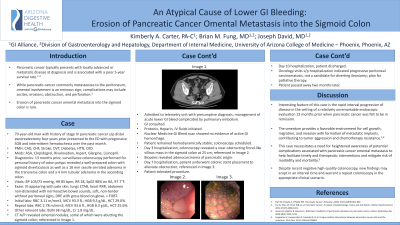Sunday Poster Session
Category: Colon
P0235 - An Atypical Cause of Lower GI Bleeding: Erosion of Pancreatic Cancer Omental Metastasis into the Sigmoid Colon
Sunday, October 22, 2023
3:30 PM - 7:00 PM PT
Location: Exhibit Hall

Has Audio
.jpg)
Joseph David, MD
University of Arizona College of Medicine
Phoenix, AZ
Presenting Author(s)
Kimberly A. Carter, PA-C, RD1, Brian M.. Fung, MD2, Joseph David, MD2
1Midwestern University Physician Assistant Program, Glendale, AZ; 2University of Arizona College of Medicine, Phoenix, AZ
Introduction: Pancreatic cancer commonly metastasizes to the peritoneum with omental involvement being an ominous sign; however, invasion into the colon is rare. Herein, we describe a patient with metastatic pancreatic cancer eroding into the sigmoid colon.
Case Description/Methods: A 70-year-old man with a history of pancreatic cancer status post distal pancreatectomy four years prior and deep vein thrombosis on anticoagulation presented to the emergency room with progressive shortness of breath and intermittent hematochezia over the past month. Of note, thirteen months prior, the patient’s oncologist referred him for a surveillance colonoscopy for a personal history of colon polyps. The colonoscopy revealed a well-prepared colon with sigmoid diverticulosis as well as a 16 mm sessile serrated adenoma in the transverse colon and a 4 mm tubular adenoma in the ascending colon. On physical exam in the emergency room, his vital signs were significant for hypotension and tachypnea, and his skin was pale; abdominal exam was unremarkable. Laboratory results revealed a hemoglobin of 9.5 g/dL, down from 11.5 g/dL one month earlier. Computed tomography of the abdomen and pelvis revealed hypodense omental nodules, some of which were abutting the sigmoid colon. A colonoscopy was performed, revealing a large friable circumferential near-obstructing mass in the sigmoid colon. Biopsies revealed adenocarcinoma of pancreatic origin, and the patient subsequently underwent colonic stent placement to alleviate the obstruction. He was discharged home on hospital day ten and passed away two months later.
Discussion: Pancreatic cancer typically presents with locally advanced or metastatic disease at diagnosis and is associated with a poor 5-year survival rate. While pancreatic cancer commonly metastasizes to the omentum, invasion into the colon is extremely rare with few cases identified in the literature. Another interesting feature of this case is the rapid interval progression of disease in the setting of a relatively unremarkable endoscopic evaluation thirteen months prior when his pancreatic cancer was felt to be in remission. A lesson learned from this case is that despite recent negative high-quality colonoscopy, new findings may erupt in an interval time and warrant a repeat colonoscopy in the appropriate clinical scenario.
Disclosures:
Kimberly A. Carter, PA-C, RD1, Brian M.. Fung, MD2, Joseph David, MD2. P0235 - An Atypical Cause of Lower GI Bleeding: Erosion of Pancreatic Cancer Omental Metastasis into the Sigmoid Colon, ACG 2023 Annual Scientific Meeting Abstracts. Vancouver, BC, Canada: American College of Gastroenterology.
1Midwestern University Physician Assistant Program, Glendale, AZ; 2University of Arizona College of Medicine, Phoenix, AZ
Introduction: Pancreatic cancer commonly metastasizes to the peritoneum with omental involvement being an ominous sign; however, invasion into the colon is rare. Herein, we describe a patient with metastatic pancreatic cancer eroding into the sigmoid colon.
Case Description/Methods: A 70-year-old man with a history of pancreatic cancer status post distal pancreatectomy four years prior and deep vein thrombosis on anticoagulation presented to the emergency room with progressive shortness of breath and intermittent hematochezia over the past month. Of note, thirteen months prior, the patient’s oncologist referred him for a surveillance colonoscopy for a personal history of colon polyps. The colonoscopy revealed a well-prepared colon with sigmoid diverticulosis as well as a 16 mm sessile serrated adenoma in the transverse colon and a 4 mm tubular adenoma in the ascending colon. On physical exam in the emergency room, his vital signs were significant for hypotension and tachypnea, and his skin was pale; abdominal exam was unremarkable. Laboratory results revealed a hemoglobin of 9.5 g/dL, down from 11.5 g/dL one month earlier. Computed tomography of the abdomen and pelvis revealed hypodense omental nodules, some of which were abutting the sigmoid colon. A colonoscopy was performed, revealing a large friable circumferential near-obstructing mass in the sigmoid colon. Biopsies revealed adenocarcinoma of pancreatic origin, and the patient subsequently underwent colonic stent placement to alleviate the obstruction. He was discharged home on hospital day ten and passed away two months later.
Discussion: Pancreatic cancer typically presents with locally advanced or metastatic disease at diagnosis and is associated with a poor 5-year survival rate. While pancreatic cancer commonly metastasizes to the omentum, invasion into the colon is extremely rare with few cases identified in the literature. Another interesting feature of this case is the rapid interval progression of disease in the setting of a relatively unremarkable endoscopic evaluation thirteen months prior when his pancreatic cancer was felt to be in remission. A lesson learned from this case is that despite recent negative high-quality colonoscopy, new findings may erupt in an interval time and warrant a repeat colonoscopy in the appropriate clinical scenario.
Disclosures:
Kimberly Carter indicated no relevant financial relationships.
Brian Fung indicated no relevant financial relationships.
Joseph David indicated no relevant financial relationships.
Kimberly A. Carter, PA-C, RD1, Brian M.. Fung, MD2, Joseph David, MD2. P0235 - An Atypical Cause of Lower GI Bleeding: Erosion of Pancreatic Cancer Omental Metastasis into the Sigmoid Colon, ACG 2023 Annual Scientific Meeting Abstracts. Vancouver, BC, Canada: American College of Gastroenterology.
